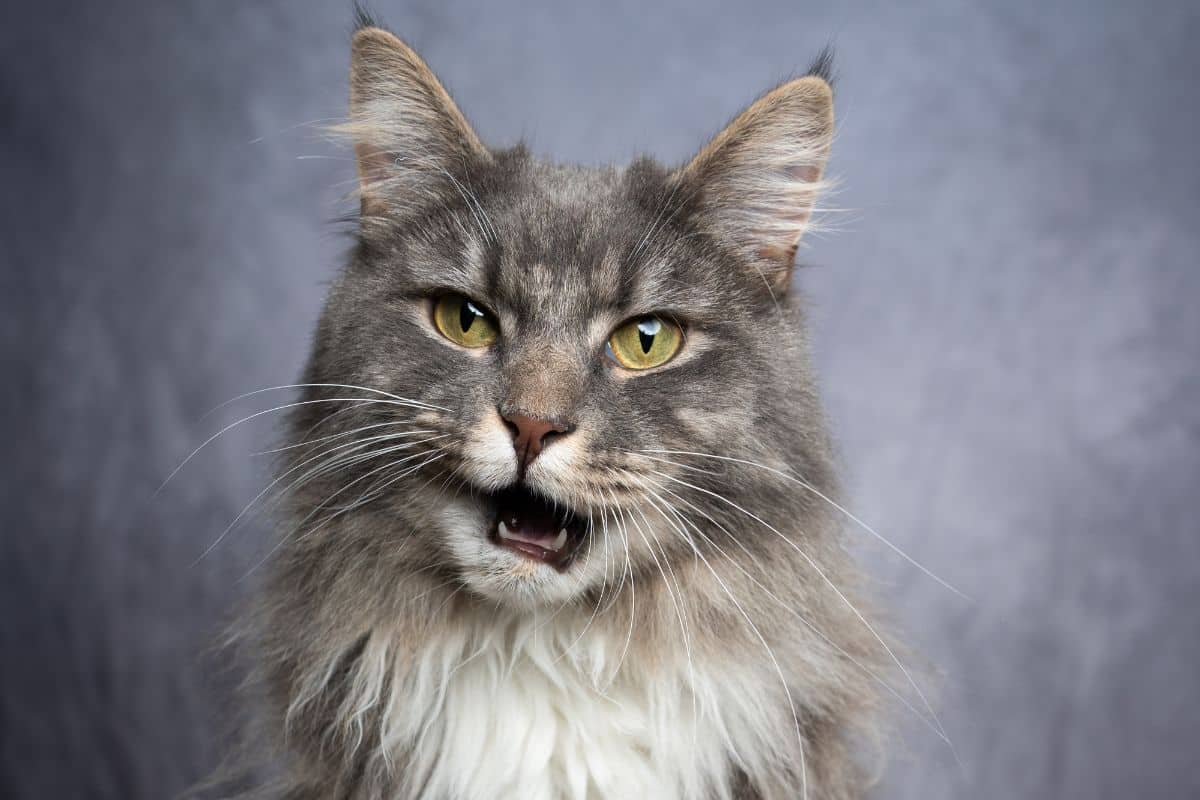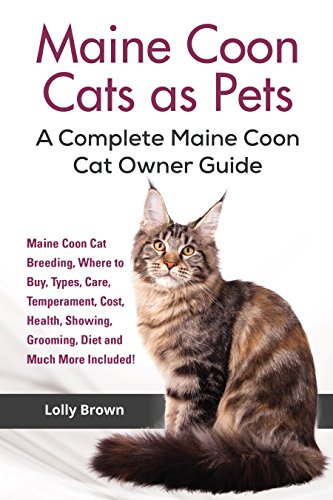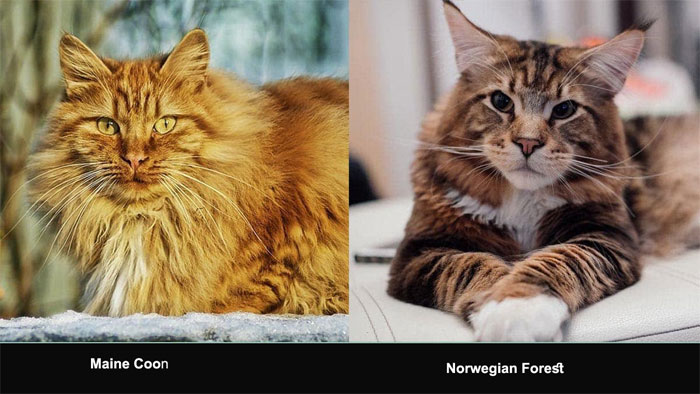To stop a Maine Coon from meowing excessively, determine the cause and address any needs or behavioral issues. Consistent training and environmental enrichment are key strategies.
Maine Coons are known for their sociable and vocal nature, often expressing themselves through distinctive meows. As a responsible pet owner, it’s essential to understand that these gentle giants communicate for various reasons, such as hunger, attention-seeking, or even health issues.
Creating a stimulating environment with plenty of toys, interactive playtime, and attention can help minimize unnecessary vocalization. A well-rounded approach involves regular health check-ups to rule out any underlying medical conditions and maintaining a consistent routine to provide a sense of security for your furry friend. Addressing these factors effectively can reduce the frequency of your Maine Coon’s meows, ensuring a happier and more tranquil home for both you and your pet.

Credit: www.lovemeow.com
Decoding The Maine Coon Meow
The melodic meow of a Maine Coon can be music to a cat owner’s ears, yet sometimes it becomes a mystery. Why do these furry giants vocalize more than their feline counterparts? Understanding the nuances of their meows is crucial in maintaining a harmonious relationship with these majestic creatures.
Identifying Reasons Behind Vocalization
Maine Coons communicate for various reasons. Their extensive vocabulary can signify hunger, boredom, or a mere desire for attention. It’s essential to distinguish these meows to cater to their specific needs effectively.
- Hunger: A persistent, escalating meow often signals mealtime.
- Boredom: A chirpy, plaintive cry may indicate a need for interaction.
- Attention: A soft, gentle meow is usually a call for affection.
- Discomfort: Sudden, loud vocalizations warrant immediate attention; your cat might be in distress.
Recognizing Patterns And Triggers
By observing when and how your Maine Coon meows, you can identify patterns. Create a peaceful environment that minimizes the causes of excessive meowing.
| Trigger | Pattern | Action |
|---|---|---|
| Mealtime | Loud, consistent meowing | Establish a feeding routine |
| Loneliness | Extended meowing at odd hours | Provide toys and interaction |
| Strangers | Chattering or hissing | Introduce new people gradually |
| Health Issue | Change in meow’s tone | Visit a veterinarian |
Establishing A Quiet Routine
Establishing a Quiet Routine for your Maine Coon can drastically reduce excessive meowing. Cats are creatures of habit. A stable and predictable routine reassures them, making them feel secure and content. This calmness often results in less vocalization. Let’s explore how a regular feeding schedule and consistent interaction can promote a peaceful environment for your feline friend.
Feeding Schedule
Setting a precise feeding schedule helps your Maine Coon understand when to expect food. This reduces anxiety and incessant meowing for meals. A consistent routine does not confuse your cat. Your Maine Coon will learn that meowing does not influence meal times.
- Serve meals at the same times every day.
- Use automatic feeders to maintain consistency.
- Keep portions equal to prevent overfeeding or hunger.
Interaction Importance Of Consistency
Regular playtime and affection are crucial for your Maine Coon’s well-being. An engaged cat is a quiet cat. Schedule daily play sessions. Stick to these times as closely as possible. Your cat will anticipate these moments, reducing the need to meow for attention.
| Activity | Time | Benefit |
|---|---|---|
| Playtime | Morning | Energy release |
| Cuddle Time | Evening | Emotional bonding |
Interactive Play And Exercise
Does your Maine Coon meow too much? It’s often a call for attention or boredom. Regular interactive play and exercise can help. This keeps your fluffy friend happy and healthy. It’s the key to a quiet, contented Maine Coon.
Types Of Play And Toys
Maine Coons need the right kind of play. It should match their size and energy. Think big and action-packed.
- Feather wand toys – Great for jumping and hunting skills.
- Interactive mouse toys – Mimic prey to chase.
- Laser pointers – Lead to lots of running.
- Jumbo-sized balls – Perfect for batting and rolling.
Promoting Mental Stimulation
Mental exercise is as important as physical activity. Keep your Maine Coon’s brain busy with these ideas:
- Puzzle feeders – Offer treats as rewards for solving puzzles.
- Training sessions – Teach tricks or commands.
- New environments – Explore safe outdoor spaces or new rooms.
- Hide and seek – Hide toys for your cat to find.
Rotate toys to keep things fresh and engaging. This will ensure your Maine Coon never gets bored!
Training Techniques For Silence
Training a Maine Coon to reduce their meowing takes patience and consistency. These large, affectionate cats can be quite vocal, but with the right techniques, it’s possible to encourage quieter behavior. Let’s explore some effective training methods.
Reward-based Training
Positive reinforcement works wonders with Maine Coons.
- Identify a desired quiet behavior to encourage.
- Choose a reward that your Maine Coon loves, such as a special treat or affection.
- Wait for moments when your cat is silent.
- Immediately give the reward to create a positive association.
Repeat this process to reinforce the quiet moments over time. Your Maine Coon will start associating silence with good things.
Ignoring Unwanted Behaviors
Ignoring a loudly meowing Maine Coon might seem tough, but it can be an effective approach.
- Stay calm and do not respond to the meowing with attention, negative or positive.
- Continue your activities as if you don’t hear the meows.
- Wait until your cat stops meowing, even if it’s just for a brief moment.
- Only then, reward the silent behavior with attention or treats.
This teaches your Maine Coon that quiet behavior gains attention, while meowing does not lead to immediate interaction.
Creating A Comforting Environment
Excessive meowing in Maine Coons often stems from discomfort in their surroundings. With their majestic fur and wise demeanor, these gentle giants seek a harmonious haven to thrive. Creating a comforting environment can work wonders in soothing your vocal feline and minimizing their need to meow. The following strategies help establish tranquility and serenity within your home, providing your Maine Coon the peace it craves.
Stress Reduction Strategies
Felines are sensitive to stress, just like humans. Addressing the underlying causes of stress can significantly reduce excessive meowing. Here are some simple yet effective strategies:
- Consistent daily routines
- Interactive play sessions
- Frequent petting and grooming
These methods foster trust and security, paving the way for serenity.
Providing Safe And Quiet Spaces
Maine Coons treasure their quietude. Here’s how to ensure they have it:
| Location | Benefits |
|---|---|
| Cozy Nook | Sheltered area away from noise |
| High Perch | Elevated spot for surveillance |
These havens encourage relaxation and reduce the need for vocal communication.
Health Considerations And Vet Consultations
Your Maine Coon’s persistent meowing could signal something more than a mere desire for attention. To ensure the well-being of your feline friend, understanding the underlying health considerations is crucial. A vet consultation may uncover health issues prompting your Maine Coon’s vocal behavior.
Assessing For Medical Issues
Like humans, cats communicate discomfort through various behaviors, including meowing. Observe your Maine Coon for signs of distress or changes in behavior.
- Check for physical signs of illness – limping, changes in appetite, or unusual sleeping patterns can indicate health problems.
- Monitor litter box usage for any irregularities, as issues with urination or defecation can prompt excessive meowing.
- Note the meowing patterns – constant, urgent meowing merits immediate veterinary attention.
Early detection can prevent more serious conditions from developing and reduce undue stress for both you and your cat.
Professional Advice On Behavior
Behavioral concerns in Maine Coons often require professional insights. Consult a vet or a feline behaviorist to pinpoint the cause of your cat’s meowing.
| Professional | Reason to Consult | Expected Outcomes |
|---|---|---|
| Veterinarian | Health check-up, potential medical issues. | Diagnosis, treatment plan. |
| Feline Behaviorist | Assessment of behavioral causes. | Custom behavioral modification strategies. |
Seek professional advice if the meowing persists despite your best efforts. This can lead to tailored solutions to restore peace and health to your Maine Coon’s life.
Managing The Nighttime Serenades
Does your Maine Coon turn into a nocturnal opera star as soon as the lights go out? These majestic felines are known for their chatty behavior, but nighttime meows can disrupt a peaceful sleep schedule. Understanding their nighttime habits is key to restoring your rest. Let’s explore effective ways to manage your furry friend’s evening vocal performances.
Pre-bedtime Routines
Establishing a calm pre-bedtime routine can signal to your Maine Coon that it’s time to wind down. Like humans, cats thrive on consistency and familiarity before sleep.
- Playtime: Engage in interactive play to expend energy.
- Dinner: Schedule a filling meal to promote sleepiness.
- Comfort: Ensure a cozy sleep area for your cat.
A set routine eases your Maine Coon into a peaceful state, minimizing their urge to meow for attention at night.
Solutions For Uninterrupted Sleep
Soothing nighttime serenades is possible with a few adjustments.
- Ignore: Don’t reward meowing with attention or food.
- Noise: White noise machines can mask meows.
- Check-up: Rule out medical reasons for excessive meowing.
Understanding your Maine Coon’s needs ensures you both enjoy restful nights. Try these strategies to transform your nights into quiet havens.

Credit: www.reddit.com

Credit: www.facebook.com
Frequently Asked Questions On How To Stop A Maine Coon From Meowing
Why Does My Maine Coon Cat Meow So Much?
Maine Coon cats often meow frequently due to their social and communicative nature. They may seek attention, express hunger, or desire interaction. Regular veterinary check-ups ensure their meowing isn’t health-related.
Why Are Maine Coons Vocal?
Maine Coons are vocal due to their sociable nature. They use distinct meows to communicate with their owners, expressing needs and emotions.
How Do You Discipline A Cat To Stop Meowing?
Discipline your cat by ignoring constant meowing, as attention often reinforces this behavior. Use toys to distract them, and establish a routine for play and meals to reduce meowing. Never punish your cat; instead, reward quiet behavior with treats and affection.
How Do You Calm A Cat That Won’t Stop Meowing?
To calm a persistently meowing cat, provide a comfortable environment with access to food, water, and a clean litter box. Engage your cat in regular playtime to expend energy. Consider a vet visit to rule out medical issues that could be causing distress.
Conclusion
Understanding your Maine Coon’s needs is key to reducing excessive meowing. Remember, regular playtime, attention, and a comfortable environment can work wonders. Don’t hesitate to consult your vet if behavior persists, ensuring your feline friend is both happy and healthy.
Embrace these tips and enjoy a quieter, harmonious home with your majestic Maine Coon.



